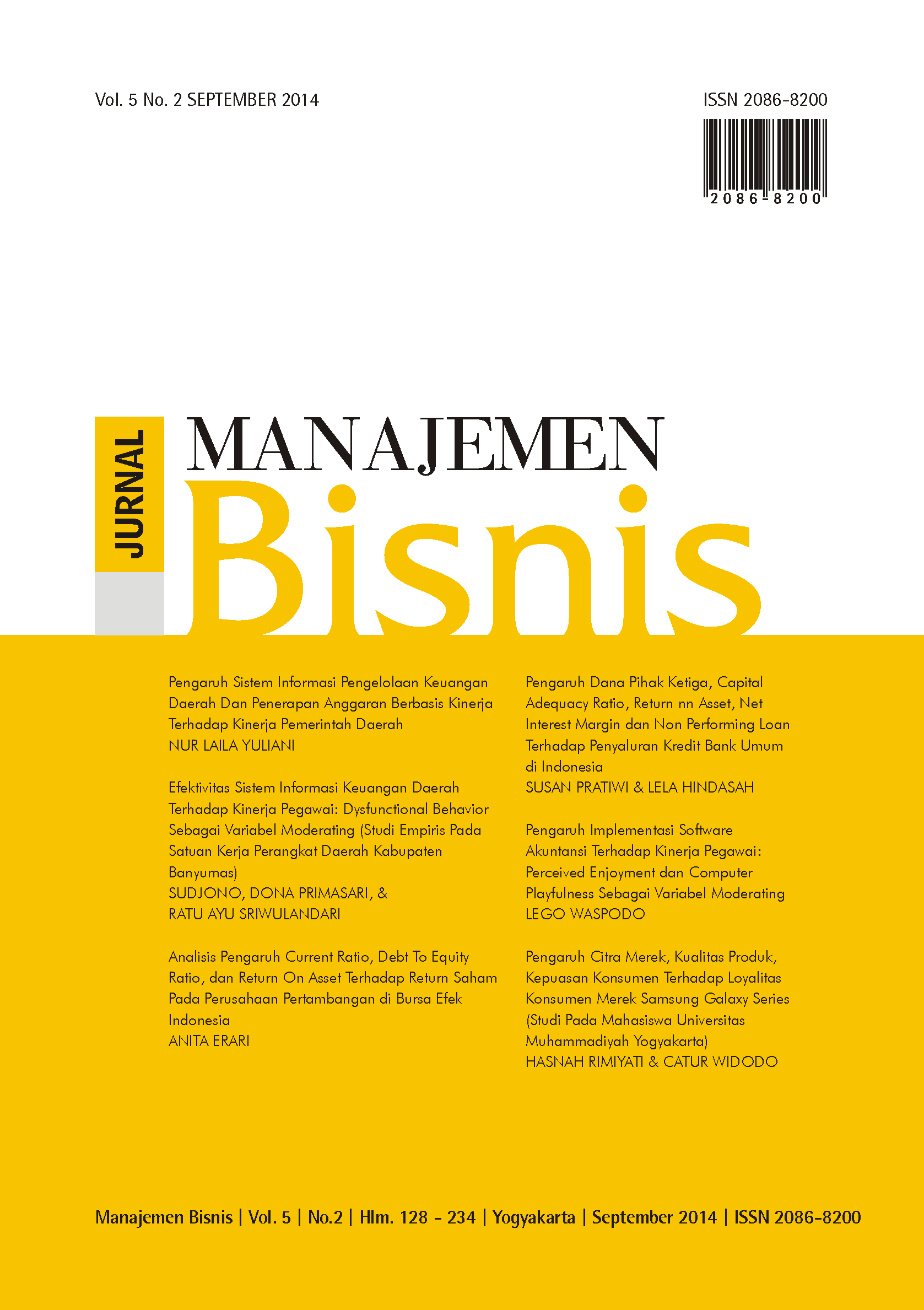Pengaruh Implementasi Software Akuntansi Terhadap Kinerja Pegawai: Perceived Enjoyment dan Computer Playfulness Sebagai Variabel Moderating
Keywords:
impelementasi software akuntansi pemerintahan (SIMDA), kinerja pegawai, perceived enjoyment and computer playfulnessAbstract
This research is based on the importance of accounting software (SIMDA) implementation to the officer performance, which is moderated with perceived enjoyment and computer playfulness. This research represents the empirical test which used census sampling technics in data collection. The data were collected from 40 officers on Kabupaten Lampung Timur. The influence of accounting software (SIMDA) implementation to the officer performance was analyzed by using original least square regression, and the influence of two moderated variable (perceived enjoyment and computer playfulness.) to offiecer performance were analyzed by using Moderated Regression Analysis (MRA). The analysis result showed that accounting software (SIMDA) implementation variable influenced officer performance significantly. Received second hypothesis that perceived enjoyment and computer playfulness as moderated variable. The result showed indication of the importance of accounting software (SIMDA) implementation to the officer performance in doing management’s functionReferences
Abernethy, M. A., and Jan Bouwens, (2005), “ Determinants of accounting innovation”, ABACUS.
Bambang Agus Pramuka, Dona Primasari, Widyahayu W.K., (2010), Pengaruh sistem informasi akuntansi
terhadap kinerja manejerial dengan tiga variabel moderating, Jurnal JEB.
Cavalluzzo, K. S., and C. D. Ittner, (2004), “Implementing Performance Measurement Innovations: Evidence
From Government”, Accounting, Organizations and Society, Vol. 29, Nos 3–4.
Davis, F.D, Bagozzi. R.P. & Warshaw. P.R., (1989), User acceptance of computer technology: a comparison
of two theoretical models, ManagementScience, 35, 982-1003.
Fisher, Aubrey, (1990), Teori-teori dan Komunikasi, Remaja Rosdakarya, Bandung.
Hackbarth. Gary and Varun Grover. Mun Y. Yi., (2003), Computer playfulness and anxiety: positive and
negativemediators of the system experience effect on perceived ease of use, Journal Information &
Management.
Hirst, M.K., (1981), “Accounting Information and the Evaluation of Subordinate Performance: A Situational
Approach”, The Accounting Riview 56(4): 771-784.
Honeman, C.T., (1997), “Introduction to managerial performance”, Prentice Hall.
Igbaria, (1989), “ A path analytic study of individual characteristic, computer anxiety, and attitudes toward
microcomputer”, Journal of Management, Vo.15. No. 3.
Indriantoro, Nur., Bambang Supomo, (1999), “Metode Penelitian Bisnis Untuk Akuntansi Dan Manajemen”,
Edisi Pertama, Penerbit BPFE-Yogyakarta. Yogyakarta
Macintosh,N.B., (1994), “Management accounting and control system”, Jhon Willey and sons.
Meirinto,Wahyu, (2011), “Kajian Online system Informasi BRI (BRINETS): pendekatan Technology Accpetance
Model(TAM), Jurnal Akuntansi Multi Paradigma, Vol.2 No.1.
Nunnaly, J. C. And I.H., Bernsten, (1994), Psycometric Theory, McGraw-Hill.3 th. Ed.
Otley, D., (1995), “Management control, organization design and accounting information system”.UK:
Prentice Hall.
Ghozali, Imam, (2001), Aplikasi Analisis Multivariate dengan Program SPSS, Badan Penerbit Universitas
Diponegoro Semarang.
Primasari, Dona, (2013), Pengaruh implementasi Sistem Informasi Keuangan Daerah dan Kinerja Pegawai:
Kualitas informasi laporan keuangan sebagai variabel intervening, Jurnal Ekonomi dan Bisnis Optimum
Vol. 3 No. 2.
Riyanto, Bambang, (2001), Dasar-Dasar Pembelanjaan Perusahaan, Edisi Keempat, Cetakan Ketujuh,
Yogyakarta: BPFE.
Robbins, Stephen, (2003), “ Organizational Behavioral”, Prentice Hall, Inc.
Sujono, dkk., (2014), Pengaruh implementasi sistem akuntansi keuangan daerah terhadap kinerja pegawai,
Riset mandiri, tidak dipublikasikan.
Venkatesh, V, & Morris M. G., (2000), Why Don’t Men Ever Stop to Ask for Direction? Gender, Social
JURNAL MANAJEMEN & BISNIS
Influence and their Role in Technology Acceptance and Usage Behavior. MIS Quarterly, Vol. 24 No. 1,
March.
Venkantesh, V., dan Hillol Bala, (2008), Technology Acceptance Model 3 and research agenda intervention,
Decision Science Vol. 39.
Waspodo, Lego, (2013), “Pegaruh teknologi informasi terhadap kinerja individual: computer anxiety sebagai
variabel moderating”, Konferensi Nasional Akuntansi dan Bisnis, Serang, Banten.
Wahyundaru, Sri Dewi, (2001), Akuntansi Sektor Publik dalam Otonomi Daerah, Suara Merdeka, Edisi
Februari.
Widiastuti, Budi, (2006), Pengaruh Beban Kerja Motivasi dan Kemampuan terhadap kinerja Pegawai
Pada Dinas Kesehatan Propinsi Jawa Tengah, Program Pascasarjana Universitas Diponegoro, Semarang.
Yunita, Dian, (2004), “Pemgaruh tingkat computer anxiety terhadap keahlian dosen akuntansi dalam
menggunakan komputer”, Skripsi UNS Solo (Tidak Dipublikasikan).
www.bpk.go.id, Diakses 25 Juli 2014
Zhang, Ping, Heshan Sun, (2006), An Empirical Study on Causal Relationships between Perceived Enjoyment
and Perceived Ease.

Downloads
Published
How to Cite
Issue
Section
License
License
You are free to:
- Share — copy and redistribute the material in any medium or format
- Adapt — remix, transform, and build upon the material for any purpose, even commercially.
Under the following terms:
- Attribution — You must give appropriate credit, provide a link to the license, and indicate the changes made. This should be done in any reasonable manner, but not in any way that suggests the licensor endorses you or your usage.
- ShareAlike — When you remix, transform, or build upon the material, the contributions must be distributed under the same license as the original.
- No additional restrictions — You may not apply legal terms or technological measures that legally restrict others from doing anything the license permits.


